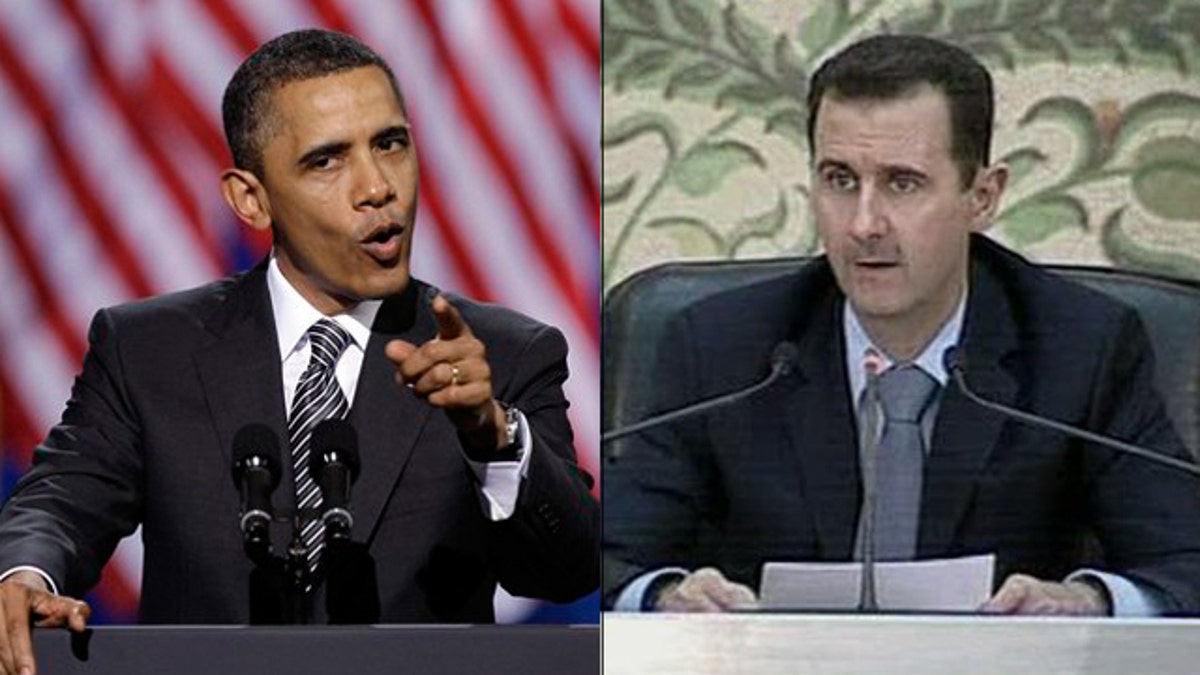
Shown here are Syrian President Bashar Assad, right, and President Obama. (AP)
The Obama administration is stepping up its response to Syrian President Bashar Assad's deadly crackdown on protesters, preparing what officials describe as "targeted sanctions" against the regime.
The White House confirmed Monday that the United States is looking at a range of options to punish the regime for the crackdown and perhaps deter further violence. Hundreds have been killed since last month, but the clashes escalated over the past few days as government security forces confronted protesters in the streets with tanks and snipers. At least 11 people reportedly were killed Monday as soldiers descended on the city of Daraa, firing on civilians and dragging opposition supporters from their homes.
White House Press Secretary Jay Carney said the U.S. wants to make clear that the behavior is "unacceptable" and will look at ways to "increase the pressure" on the Syrian government.
"We're certainly looking at different ways to make clear to the Syrian government how appalling we find this behavior to be and to encourage them ... to stop the violence and to move toward serious reform," he said.
He and National Security Council spokesman Tommy Vietor both said the administration is looking at "targeted sanctions," without elaborating on what they might entail.
"The brutal violence used by the government of Syria against its people is completely deplorable and we condemn it in the strongest possible terms," Vietor said in a statement. "The Syrian people's call for freedom of expression, association, peaceful assembly, and the ability to freely choose their leaders must be heard."
The Wall Street Journal first reported that sanctions were being drafted against the Syrian regime amid a growing sentiment that Assad's government is becoming more fragile. The Journal reported that the administration is looking to freeze assets of senior Syrian officials and prohibit them from doing business in the United States.
The sanctions might not have much direct impact, as Syrian officials have limited assets in the U.S., and 2004 sanctions already prohibit most trade between the United States and Syria. But U.S. officials told the Journal that the new proposals could pressure European nations, where the Syrians have a bigger financial stake, to impose similar measures.
The administration has faced mounting calls to get tough on Assad's regime. Though the United States has committed its military to fighting alongside NATO allies in Libya to keep Muammar al-Qaddafi at bay, the Obama administration has until now not gone beyond issuing critical statements when it comes to Syria.
Assad last week agreed to lift the country's decades-old emergency laws. But after demonstrations continued, security forces responded with arrests and gunfire.
Obama said Friday that the response showed Assad's actions were not serious. The president said the regime's "outrageous" use of violence must "end now."
Obama had, until the uprisings, tried to ease tension between Washington and Damascus. Reversing Bush administration policy, he earlier appointed an ambassador to Syria. Carney said Monday that having a U.S. ambassador in Damascus remains a useful tool, because it allows the administration to voice its "strenuous objections" to the Assad government's behavior.











































